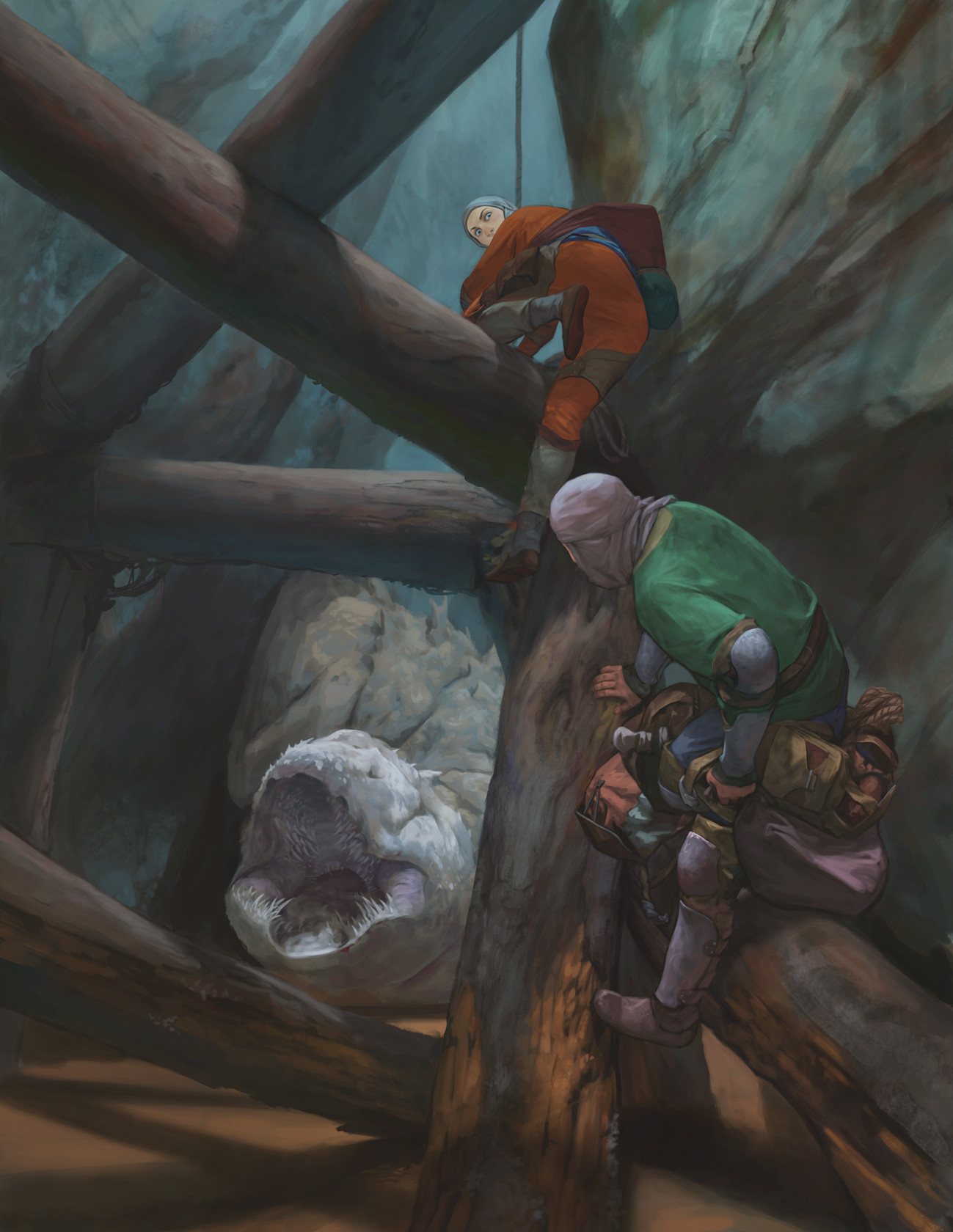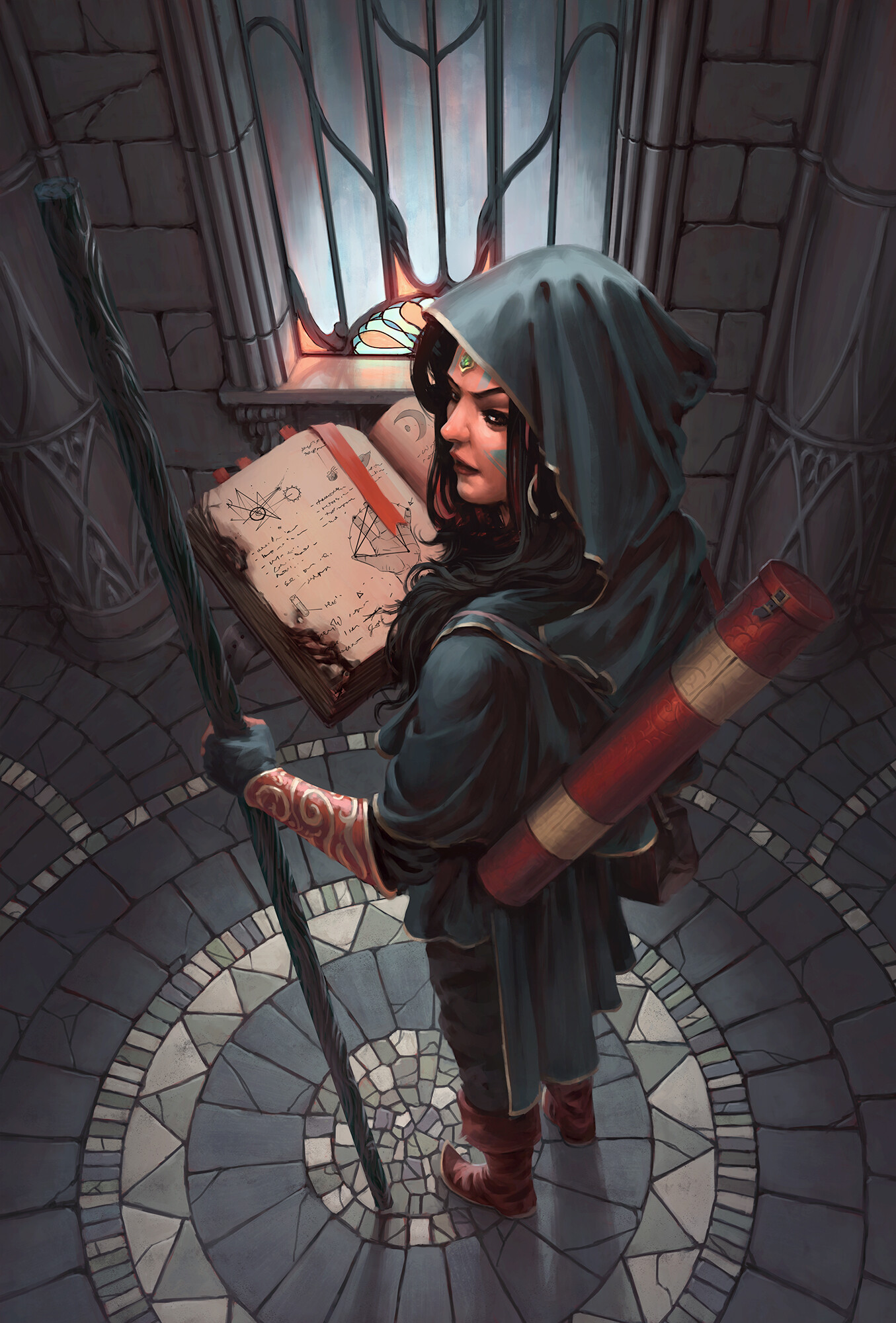Survivalist Talents
1. Herbal Remedies: When making a forage roll, you can forego finding rations and, instead, find 1d6-2 herbs usable for healing (your level+1d6 HP) or curing ailments (paralysis, etc).
2. Night Vigil: When camping, you can gain advantage on the encounter die after describing your watch routine and setting up a perimeter by means of your choosing.
3. Ruin Seeker: When exploring, you can gain advantage on the encounter die by burying 10 gold pieces in the dirt. If a hidden feature is found, you gain a keen awareness of the first inhabitants encountered.
4. Deft Quartermaster: Your rations, herbs, potions, and 50' coils of rope can be bundled two to an inventory slot.
5. Natural Empathy: You can gain advantage on morale checks and reaction rolls against beasts or unintelligent monsters encountered in wilderness or dungeon environments.
6. Steady Frame: You can gain advantage on all saves related to fear, charm, or poison effects against your person.
In my mind, the classic ranger is less a monster-hunting/beast-companion-befriending/nature-loving outsider and more a seasoned explorer and tracker. She isn't so much the serene elven longbow sharpshooter as she is the merc who knows the lay of the land and isn't intimidated by the wilderness. It's on this definition that I've based the flavor behind survivalist talents.
"Looters" by Stepan Alekseev
When I previously talked about exploration I framed the whole process as an adaptation of the d6 encounter die. Anyone can make a forage roll when hexploring, but Herbal Remedies allows a PC to forego found rations in exchange for a bit of field medicine by way of herbal tinctures or poultices derived from the wilds. Night Vigil allows for a bit of added security during evening encounter die checks. I want to leave this description open to interpretation to allow a bit of valid roleplay to accompany the mechanical benefit of keeping watch, which is an activity typically quickly skimmed-over in my experience. Ruin Seeker is probably my favorite of the lot, linking the survivalist with a bit of folk ritual and supposing that adventurers can bargain with the wilderness itself.
No canny explorer can manage all of their adventuring gear on an extended expedition without picking up a bit of logistical expertise along the way. Deft Quartermaster allows the PC to combine multiple dungeoneering/exploration tools which normally take a whole inventory slot apiece into smaller bundles packed two to a slot. Suddenly, carrying that golden idol out of the depths is much easier when all of your adventuring gear is nearly tetris'd in your rucksack. Similarly, experience with the denizens of the wilds and mythic underworld allows a PC to use Natural Empathy in order to better manage encounters with animals and non-sapient monsters. Finally, overall rustic expertise provides the adventurer with a Steady Frame, giving them additional gusto against the guile of the dungeon landscape.
Arcane Talents
1. Page Master: Your spellbooks can be bundled two to an inventory slot.
2. Muscle Magic: You can add +2 to your defense die result a number of times equal to your number of spellbooks daily.
3. Runic Flesh: Choose one of your spellbooks and spend a day transferring its magic to your skin as a visible tattoo. From now on, you can cast the spell twice daily without the spellbook, but you inflict four damage on yourself to do so.
4. Reliable Cantrip: You can generate dim light, faint sound, or a light breeze from the palm of your hand. You can also extend your reach invisibly by 30' with your normal strength.
5. Mental Whisper: You can speak into another person or monster's mind a number of times equal to your number of spellbooks daily. They can understand your meaning even if you don't share a language, but can't respond. If they're not expecting it, make a doom save. They panic on a failure.
6. Cerebral Ward: You can gain advantage on all saves related to magic of any origin.
There are approximately 3,692 different RPG magic systems, but given the inventory-centric nature of Knave writ large, I tend to like Knave's physical-spellbook-as-actual-spell-slot idea quite a lot. A giant tome filled with nigh-inscruitible arcana that requires a bit of physical commitment both to carry and use makes for each spell being a potent tool but serious commitment to lug on adventures. Similar to the survivalist talent allowing for the compacting of exploration items, Page Master allows for bulky spellbooks to be better handled by aspiring magi. How does it work? I don't know, it's magic.
"Wiz Biz" by Matthew Dobrich
Now, to really double-down on the hauling-spellbooks arcane archetype, I wanted to establish a relationship between some talents and the number of spellbook held by the adventurer. 1:1 scaling towards a few of the talents seems to do the trick in my mind, and Muscle Magic is meant to leverage that directly by effectively giving an arcanist the ability to boost their defense die result in much the same way as Berserker Frenzy boosts the damage die in the aformentioned martial talent list. Does the spellbook-bearer actually use their spellbooks as physical bulwarks to aid in their defense? Is it because they're swole from carrying around all of their bulky grimoires? I don't know, but all of the mental images I associate with this talent in action make me smile.
Spellbooks can be used only once per day given inscruitble laws of magic, you know. That is still a lot of utility and possible firepower at any caster's disposal, but what if you wanted to really commit to magic? Why not scrawl the magic into your skin, tattoo-style, with Runic Flesh? Cast the spell directly from your body twice a day, at the cost of quivering chaotic energy searing forth from your organs in the process. For a more consistent, low-risk talent, magical acolytes can take the Reliable Cantrip talent, which affords them simple but useful parlor-trick tools, as well as the closest thing to a Mage Hand-analogue in this vein of play. Personally, I'd love to pair this talent with a few from the specialist list as a take on the "arcane trickster" idea.
I've always thought that any kind of telepathy or unheard speech is way more potent in play than such abilities are usually weighted by mechanical considerations. Mental Whisper allows for direct telepathic communication a number of times daily based on your number of spellbooks, but at a cost: if unaware that you're about to probe its brain and transmit language, the target has to make a doom save (you are invading their mind, after all). On a success, nothing bad happens. On a failure, the target can still hear you, but it is 100% wigged out. Think about it.
Not unlike Steady Frame, above, the Cerebral Ward talent is a simple, if useful, defensive buff against magic. All magic. It's magical.


No comments:
Post a Comment